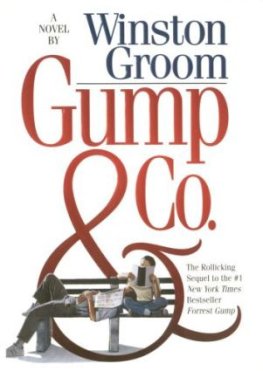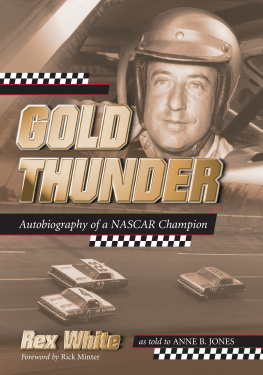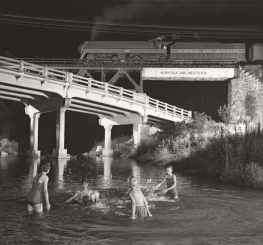In memory of my friend, T. Wayne Robertson, for his years of dedication and service to NASCAR Winston Cup Series racing.
In honor of my team owner, Rick Hendrick, for the determination and courage he has shown in his battle against leukemia.
BY BOB ZELLER


J EFF GORDON, in 1997, had one of the finest seasons in the history of the NASCAR Winston Cup Series. No driver has ever accomplished all that Jeff did in the 32 races that made up the 1997 campaign. He won everything that meant anything.
Behind the wheel of his rainbow-colored No. 24 Dupont Chevrolet Monte Carlo owned by Hendrick Motorsports, Jeff won his second Winston Cup championship. He won the Daytona 500. He won the Coca-Cola 600. He won the Southern 500 and became only the second driver to win NASCARs toughest prizethe Winston Million. He won The Winston. He won the Busch Clash.
He won 10 races on 10 different tracks. He won at a superspeedway, a 2.5-mile speedway, a two-mile speedway, a 1.5-mile speedway, a one-mile banked track, a one-mile flat track, the Lady in Black at Darlington, both short tracks and a road course.
He did all of this in a season otherwise dominated by Ford drivers. And he did it in an era of unprecedented competition in stock car racing. When he won at Martinsville in April, the difference between winning the pole position and not making the race was about four-tenths of a second.
Other drivers have won more races in a year. They have established most impressive winning streaks. They have won their championships by wider margins. They have clinched the title earlier in the season.
But no one has ever achieved Jeffs record of all-around brilliance in 1997. Not only did he win on just about every type of track in the NASCAR Winston Cup Series, he won in just about every way a driver can win a race.
He won by passing the leader on the last turn of the last lap. He won by holding off a challenge from another driver on the last lap. He won a race by figuring out how to make the outside groove work. He won by sheer dominance in handling and horsepower. He won a gas mileage battle. He won under a yellow flag.
His domination of the season was so thorough and so frustrating to the fans of other drivers, particularly those of Dale Earnhardt, that Jeff began to elicit the same reaction golf fans had when Jack Nicklaus de-throned Arnold Palmer.
Nearly every week, Jeff was asked about the fans booing. And every week, he would face it straight up, sometimes with a chuckle or his boyish smile, and he would say that it was just part of the sport. We just grin and wave and go on our way, he said.

Photo Credits: CIA Photo Stock
Ironically, Jeff discovered, just as Earnhardt had a decade earlier, that the more fans booed, the more popular he became. His appearances were never more crowded than in 1997. He sold more collectibles than ever before. During the holiday season, his 1998 calendar maker had to go to press three times to satisfy the demand.
The impressiveness of Jeffs 1997 race record masks the excruciating struggle he faced to top it off with the NASCAR Winston Cup championship.
As it turned out, after he posted his 10th victory at New Hampshire International Speedway in early September, he did not win another race. Seven races remained after New Hampshire.
But in those final two months of racing, even though he did not win again, Gordon faced a challenge that would forever color not only the success of 1997, but the legacy of his first five years in the NASCAR Winston Cup Series.
Since entering the NASCAR Winston Cup Series in 1993, Jeff had been blessed with enough success to make two or three respectable careers for lesser mortals who race stock cars for a living.
He was the NASCAR Winston Cup Rookie of the Year in 1993. His first victory came in 1994 at one of NASCARs major racesthe Coca-Cola 600 at Charlotte Motor Speedway. Two months later, he won the inaugural Brickyard 400 at Indianapolis Motor Speedway.
In 1995, his third full season in the NASCAR Winston Cup Series, Jeff won seven races and his first Winston Cup championship. In 1996, he won 10 races.

Photo Credits: Ernest Masche
But 1996 had ended with disappointment. He had owned the championship points lead most of the season, only to see it slip away to teammate Terry Labonte in the end.
Jeff had finished off the 1995 title with a whimper rather than a flourish, finishing 32nd at Atlanta, 14 laps behind the leader. He won the championship by 34 points over Dale Earnhardt. That did not please him.
And then the 1996 championship slipped away altogether. That set-back gave Jeff and his team all the motivation they needed for the 1997 season. But it also put him at a distinct crossroad. He had won one championship. And he had lost one.
In 1997, after establishing himself as the dominant driver in the NASCAR Winston Cup Series for the third straight year, all Jeff had to do in the stretch run was finish it off.
If he failed, he would have been considered a driver who was known for winning races but failing to win championships. He would have established an impressive record of 27 race victories in three years and a not-so-impressive record of 1-2 in the championship.
There are great athletes and great teams in every sport who must shoulder this burden. In golf, it has been Greg Norman. In football, the Buffalo Bills play this role. In baseball, it has been the Atlanta Braves.
Had he lost the 1997 title, Jeff would have to win another two championships to fully erase the reputation of the superstar who couldnt get the job done when it really counted.
And that is why the season-ending NAPA 500 at Atlanta Motor Speedway on November 16, 1997, was the most important race of Jeff Gordons racing lifethe rubber match for five years worth of racing stock cars. It was a genuine, 100 percent, American challenge.
The task seemed easy enough on paper, considering Jeffs 1997 record. All he had to do was finish 18th or better to win the title. The fact that he struggled to do it proved that Jeff and his team were human after all. But under the most intense pressure of his life, he did not let it get away. He won.
One could argue that it should not have come down to the Atlanta race; that Jeff should have already been celebrating his second championship before the final race.
As Mark Martin had said before the penultimate race at Phoenix: If you look realistically at the things that Jeff and his team have done this year, they should be leading the points. They have outperformed us enough that they ought to be ahead of us.
But the NASCAR points system is like having a restrictor plate bolted on the championship. It is a great

Photo Credits: Don Grassmann
equalizer. It forces the points leader to adopt a conservative strategy during the stretch run. It is not about winning, it is about surviving. Dont worry about winning the race. Just finish. No matter what.
Next page












